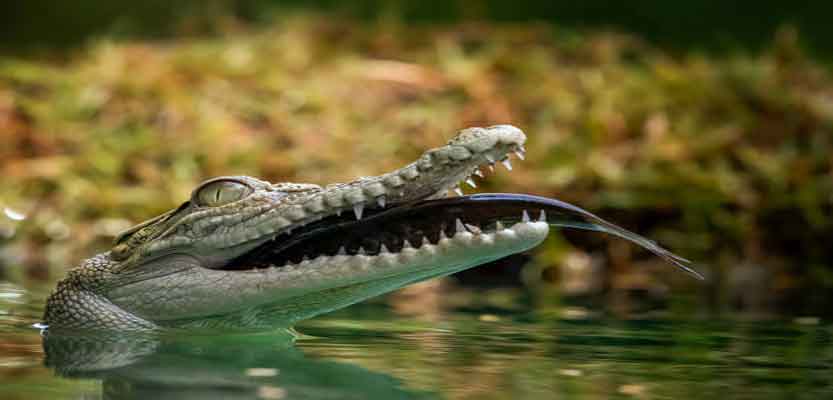
When we ask this way, we may be asking the wrong question… Why? Because crocodiles eat virtually everything they can find in their path. They will even consume humans if they get too close. Birds, fish, and reptiles are all potential sources of food for them. Let’s examine the species and their feeding habits in greater detail.
About Crocodiles
The majority of us have seen photographs and videos of crocodiles pouncing on their prey and then feasting on them. From Africa to Asia, and from the Americas to Australia, these large reptiles are found in tropical, warm-climate regions.
They belong to the “Crocodilia” family, which also includes caimans, gharials, and (due to their resemblance to crocodiles) the sometimes-confusing alligators.
There are 13 species of crocodiles worldwide, and not all of them are as large as we imagine. In fact, there is a species known as the dwarf crocodile.
It is the smallest of the species, reaching a maximum length of 1.7 meters (5’6″) and a maximum weight of 6 to 7 kilograms (13 to 15 pounds). But the one we imagine most vividly is the one that lives in saltwater.
They have little in common with dwarfs, as they can grow to more than six meters (+20 feet) in length and 900kg in weight (2,000 pound). If you encounter one, avoid getting too close. Even if you are not their preferred food, they can still make a meal out of you.
Crocodiles: What they eat
What do crocodiles consume? Everything that can be consumed. A crocodile that is hungry is not to be trifled with. It will consume anything it encounters, from reptiles to birds to fish to… humans. Let’s assume they’re not vegetarians to begin with.
They can eat a wide variety of organisms. Everything that moves, crawls, swims, or flies is included in their diet.
They have food preferences similar to our own. They enjoy eating snakes and fish (which they consider an appetizer), deer, baby elephants, cows, carrion, gazelles, wild boar, buffaloes, and kangaroos in particular.
Crocodiles are also carnivorous, so keep your dog away from areas where crocodiles reside.
One could say that crocodiles have no fear of other living creatures. They will not hesitate to attack and consume sharks if they encounter one in their territory.
The same applies to large animals like hippos and rhinoceroses. Although they have no natural predators, it is true that an angry hippopotamus can occasionally kill a crocodile. Not to eat them, as they are herbivores, but to defend itself and others.
It is challenging to kill or capture crocodiles.
Crocodiles are among the most powerful reptiles. They are also more powerful than the majority of mammals. Being so difficult to kill or capture (by humans) makes them the ideal hunter and lethal killing machine.
Add to this the fact that crocodiles enjoy feeding and gorge themselves on the flesh of their prey, and you can see how dangerous they are to all animals and humans.
A crocodile is so powerful that it can leap out of the water to catch and consume a flying bird while it is still alive. Its strength will allow it to drag small to large animals from land into its natural habitat, the water. If the animal is not already dead, the crocodile will proceed to drown it before devouring it.
And if the animal is able to swim, it will be killed by the crocodile’s extremely powerful jaw, which acts as a trap.
Entering a crocodile’s territory is a terrible idea for any living thing. This is a trait that this species cannot tolerate.
As soon as it identifies the intruder, it will attack and shred it to pieces, preventing it from escaping. This is also true of anacondas (giant water snakes), which are capable of killing nearly everything other than crocodiles.
Where a crocodile resides dictates its food.
Although it will eat almost anything, the crocodile’s diet is largely determined by its location. If it inhabits the African savannah, it will likely consume gazelles, deer, and other animals found in these regions. They would differ from, say, the ones crocodiles can find in the United States.
In addition, if a crocodile is raised in captivity, its diet will be under human control. There is a good chance that his predatory tendencies would be weakened by the fact that he does not need to hunt and kill for food.
This would not, however, lessen the danger you would face if confronted by such an animal. If you ever underestimate a crocodile, it could very well be your last mistake…
